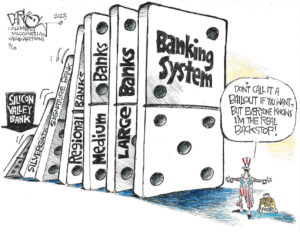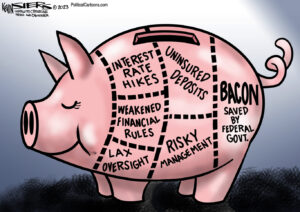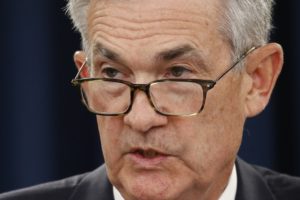A Welcome Pause Before the Bailing Starts
We all owe a debt of thanks to the skeptics who refused to be steamrollered by the Bush administration's $700-billion financial bailout plan until we at least had some understanding of what we were doing and why.We all owe a debt of thanks to the wingnuts and the populists, the soldiers of the far left and (gulp) the far right, the know-nothings and the know-it-alls, the income redistributionists and the free-market fundamentalists — all the skeptics who refused to be steamrollered by the Bush administration’s $700-billion financial bailout plan until we at least had some understanding of what we were doing and why.
Since the risk of a Wall Street meltdown is still very real, and since nobody has come up with a better idea, the bailout should go forward. It will probably save the homes and livelihoods of millions of Americans. But it will do so by absolving some of our wealthiest citizens of the consequences of their shortsightedness, dishonesty and greed.
Everyone knew we were in a housing bubble. Across the country, real estate prices were rising so fast that anyone thinking about buying a home had one logical course of action: Do it now. Anyone who already owned a home, especially in one of the red-hot markets, was building equity — or what looked like equity — so rapidly that there seemed no harm in pulling money out, even to pay for luxuries, since the property was going to keep appreciating. The nation was awash in cheap money, and everyone who owned a house was going to be rich.
As long as housing prices continued to rise, all was well. Any individual homeowner who ran into trouble with an adjustable-rate or interest-only mortgage could be refinanced back to financial health.
But bubbles inevitably burst, and here’s where the mendacity and greed come in.
Wall Street, in its collective wisdom, knew that housing prices couldn’t rise indefinitely at such an unprecedented rate. Yet Wall Street created a gargantuan market in securities and insurance, worth many trillions of dollars, based on the premise that the impossible — a housing bubble that expands forever and lasts forever — had become inevitable.
The traders who invented, sold and resold these mortgage-backed instruments, making profits and commissions with every transaction, knew what legendary swindler Charles Ponzi knew: That those who got into and out of the market while housing prices were still rising would make a lot of money, and that when prices fell someone would be left holding the bag.
To find out who that someone is, dear reader, look in the mirror.
Unfortunately, telling Wall Street to clean up its own mess isn’t an option. Already, the nation’s largest insurer, the nation’s largest savings and loan, many of Wall Street major investment banks and the mortgage giants Fannie Mae and Freddie Mac have either gone belly up, been sold or been nationalized. Commercial banks are gasping for air. Somebody has to do something to get credit flowing through the economy again, and the only entity big enough for the job is the federal government.
There may be more effective remedies than the one outlined by Treasury Secretary Henry Paulson. But I’m persuaded that it would be unwise to spend a lot more time looking for a better solution — and also that any solution is likely to be similarly expensive.
It’s a good thing, though, that we’ve had a couple of weeks to take stock. Congress can call this a “rescue plan” and festoon it with all kinds of bells and whistles, but it’s still a bailout that lets Wall Street off the hook. And in the end, despite some limits on executive compensation and stirring words about oversight, it promises nothing but a temporary setback for the “greed is good” Wall Street mentality that created this awful situation. Gordon Gekko will just lay low while the heat’s on, then come back with a vengeance. The environment’s getting hot, in more ways than one; maybe the next phantom market will be in pumped-up securities somehow based on “clean” technology.
Do we as a nation really care about those struggling homeowners who bought more house than they could afford because that was the only way for them to keep from slipping out of the middle class? Do we care that medical expenses, for the 46 million uninsured, are a chief cause of bankruptcy? Do we care that income distribution is worsening and we’re rapidly becoming a nation not of haves and have-nots, but of haves and never-gonna-gets?
Reform has suddenly become a popular word in Washington. If it’s to have any meaning at all, Congress and the new president will have a lot more work to do.
Eugene Robinson’s e-mail address is eugenerobinson(at)washpost.com.
© 2008, Washington Post Writers Group
Your support is crucial…With an uncertain future and a new administration casting doubt on press freedoms, the danger is clear: The truth is at risk.
Now is the time to give. Your tax-deductible support allows us to dig deeper, delivering fearless investigative reporting and analysis that exposes what’s really happening — without compromise.
Stand with our courageous journalists. Donate today to protect a free press, uphold democracy and unearth untold stories.







You need to be a supporter to comment.
There are currently no responses to this article.
Be the first to respond.